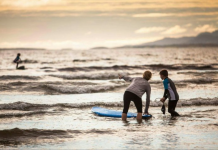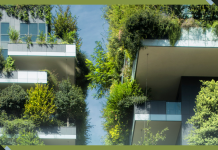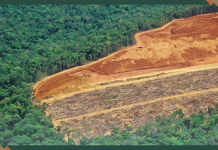In honor of International Women’s Month, The Planetary Press is highlighting women around the globe who are driving positive change for our planet and global community. Today, we are thrilled to introduce you to the Founder and Executive Director of Project Green Schools, Robin Sidman-Buchanan.

Please tell us a little about yourself and your work with Project Green Schools.
I received my Bachelor of Science with a triple major in Speech Communication, English, and Education from Ithaca and a Master of Education with a Concentration in Sociolinguistics from Massachusetts College of Liberal Arts. As a formally trained educator, I believe the key to a sustainable future is developing the next generation. In 2007, I started Project Green Schools. We grew from a tiny organization cooked up in my head to an organization whose students have earned an esteemed seat at the table… many tables. To date, Project Green Schools has reached millions of individuals with a unified vision for creating healthier bodies, schools, communities, and places of work.
As the Founder and Executive Director of Project Green Schools, I am responsible for designing and implementing the organization’s programs for the next generation of environmental leaders across the United States and around the globe. My mission is to create a healthier, more sustainable future by designing complex programs that impact students and schools. Throughout the years, I have had the privilege of working with top scholars, agencies such as The White House, the US Environmental Protection Agency, and the US Department of Energy, as well as esteemed artists, activists, and sports organizations, including the Boston Bruins, Major League Baseball (MLB), Jack Johnson, Maroon 5, Bill McKibben, and many others fighting the good fight to protect people and planet.

Can you share more about your background and how you started working in the environmental education space?
Nature has always been my home. I grew up loving to spend time in the woods, hiking many a trail, playing at the beach, or living and growing up during ten summers at overnight camp (Camp Fire Camp in the Berkshires, MA), where I developed a true appreciation for nature and the natural world. I had been a teacher, counselor, program director, and lover of the outdoors, and then I became a mother. Following the birth of my second daughter, I suffered three life-threatening anaphylactic attacks due to having a compromised immune system and my environment (internal and external).
Doctors helped me get well. Authors listened to my story and published it. State and Federal Agencies helped me get important messages out about creating healthy environments. Nonprofit organizations gave me platforms on which to speak. Then, it clicked. As a trained educator with a background in communications, I seemed to have a gift for reaching people at their core while being my authentic self. I started Project Green Schools as my way of giving back the most important kind of education: education to protect future generations and all living things. It is my life’s mission to help tackle climate change while creating healthier ecosystems for all.

What can the role of youth be in combating the triple planetary crisis?
Young people are change agents with power in their schools, places of work, and communities. Today’s youth often feel failed by generations that preceded them and are often overwhelmed by the uncertainty of their future. Young people are more aware today than ever before about the climate crisis, nature, and pollution, and many are standing together to fight for a healthier future for us all.
How can schools be a driver of change and innovation in environmental sustainability?
Schools often serve as hubs of innovation and a connecting point for people, politics, families, business, education, sports, and so much more. Schools nurture the future, our future leaders through thought, experience, education, and extracurricular activities. Schools provide safe opportunities to learn, to lead, to fail, to achieve. Schools teach communication, collaboration, evaluation, and countless skills to be successful leaders of society. When environmental sustainability concepts are embraced early in one’s formative years and through their schooling, we see behaviors and practices carried into family life, college, and places of work.

What message do you have for today’s youth who want to take action on climate change?
Your voice is powerful. Use it and act in your schools and communities. Connect with organizations like Project Green Schools, Earth Echo, and others. Seek opportunities that exist and create new paths, programs, and initiatives that don’t yet exist that tie into your communities’ values and needs.
I also encourage passionate youth to join our National Youth Council, where you can connect with like-minded students sharing best practices and ideas, and connect with a network of students and adults that go far beyond your immediate circles.
We also invite you to join our Green Schools Society programs, National Green Schools Society (NGSS) or International Green Schools Society (IGSS). Students can participate individually or as a club or class. Through NGSS and IGSS, we provide a structured program and process for high-achieving, environmentally focused students to create extraordinary impact in schools, organizations, and communities while getting the recognition they deserve on a state and national level.
We aim to support, empower, and develop bright, civic-minded environmental leaders and value our students’ passionate leadership and activism for our planet. Each year, student leaders are recognized for their environmental service and accomplishments, from National and International Green Schools Society Certificates to pins or honor stoles based on their achievements within the program.

What sets your organization apart?
At the core of our organization’s work is the student. Other organizations in the Green Schools Movement focus on the building or facility, the outdoor environment, or the educator. After spending more than a decade in formal and informal education, to me, at the core of a school was the learner— the student. School and learning can take place inside or outside, in the real world, in your home, and from your phone, iPad, or technological device. No matter where learning takes place, schools put the student— our future and the next generation— at the core of their existence and purpose. In order to have meaningful change for decades to come, our organization puts the student first, and we get them seated at some of the biggest, most important tables in schools, communities, businesses, and government.
What advice would you have for your 13-year-old self?
13-year-old me thought I knew it all. Now, I work to learn as much as I can. I realize there is still so much I wish to learn. 13-year-old me, though many think that is a young age and you don’t have much experience, knew who I was and what I loved. And at my core, 13-year-old me already knew what was most important to me was education, health, and nature, and it took me years down the road to create my own career path and find the world of Environmental Education (EE).
What book would you recommend to inspire people?
Never Be Sick Again by author and friend Raymond Francis (who is now deceased) set me on my path to wellness and having a deeper understanding of toxicity and deficiency and how to apply his scientific model to disease and all living things.
What music motivates you? Who is your favorite?
JT, the original JT, James Taylor, that is, reminds me of my happy place at camp, deep in the woods of the Berkshires, or while sitting around a campfire, or on special events at Tanglewood. His music will always inspire me and remind me of my formative years in education while developing a deep love and appreciation of nature.
Keep up with Robin and Project Green Schools!
Website: https://projectgreenschools.org/
Twitter: @GreenSchoolsOrg
Facebook: @ProjectGreenSchools
Instagram: @ProjectGreenSchools
LinkedIn: @Project Green Schools
Robin’s LinkedIn: Robin (Sidman) Buchanan, M.Ed | LinkedIn






